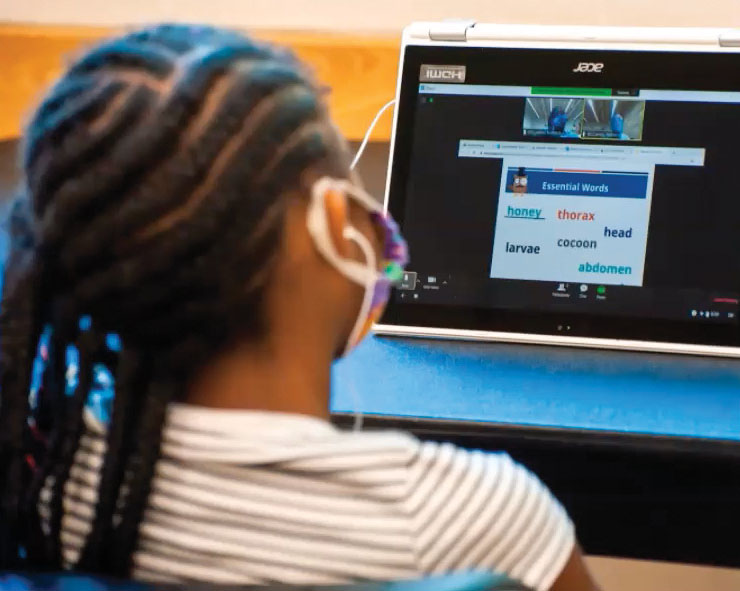Service from a distance
October 12, 2020
With social distancing in full swing, students are looking for new ways to participate in community service. Laura Day, Executive Director of the Institute for Social Impact, and other members of the Hockaday community have implemented new practices so students can engage in the same programs as recent years. So how have things changed?
This summer, Day ran four workshops to help teachers and four for students around the country to rethink community service virtually. Day said Hockaday has been a leader in community engagement and social impact.
“We have a lot of work to do, but the programs that we are going to use virtually should be really good and we are going to hopefully be able to work with kids on campus when they have breaks,” Day said.
Community Service Board Chair senior Kemper Lowry works with Day to coordinate Upper School community service programs and help create opportunities for middle and lower schoolers.
Tutoring Programs
“One of the most notable changes is in our recurring tutoring programs, which we’ve tailored to fit into the virtual world,” Lowry said.
“Because elementary students are estimated to have lost almost a year of learning due to the pandemic, keeping programs like these alive in any form is vital for the success of the children in our community,” she said.
Recurring programs from last year will be approached with the same mindset, but the tutoring
will be virtual. This includes programs such as Wesley-Rankin Community, Educational First Steps and Jubilee Tutoring. Each program will have a unique virtual tutoring protocol, including changes in a few procedures.
Tutoring with DISD pre-K through third grade was delayed until the beginning of October, when students went back to school in person. Day said DISD made the decision when volunteers from different schools tried virtual tutoring at home with the kids, but it ended up being a difficult experience due to the children’s age and not being able to focus without personal assistance.
To help with virtual tutoring, the Book Nook Tutoring app has been added to the community service options. The app allows tutors to help any DISD student, regardless of school, in need of learning assistance. Instead of signing up for a specific program or going to a specific school, tutors can just sign up for Book Nook.
“We are not doing schools anymore, we are literally doing the entire city of Dallas,” Day said. “The students who used to be leaders like for Gooch per se, are probably going to take a zip code, where they are in charge of getting tutors to help the kids who are most at risk in that zip code.”
In addition to tutoring programs, Habitat for Humanity and outdoor opportunities at Cedar Creek Reservoir, White Rock Lake and Bachman Lake will be available.
Some student-led community service clubs will look different with each club addressing COVID’s needs in different ways, like providing masks or food, or writing letters to people in assisted living communities. Along with clubs, the drives the Hockaday Community Service Board hosts have been rethought, Until students are allowed to share items, the drives will be hosted on Amazon wish
lists. Hockaday will have a wish list specific to each drive so community members can buy items for people in need.
Social Impact Classes
Day said the social impact classes will continue on schedule with few changes. This includes the Before “Me Too” and Literature of Minorities English courses; Breaking the Glass Ceiling: Economics and Social Entrepreneurship history class; and the Anatomy, Evolution and the
Zoo: Intersection of Biology, Design, and Community Impact science class. Most of the classes already functioned virtually.
The Upper School anatomy class, partnered with W.T. White High School’s Aquatic Biology class and Dallas Zoo, took a behind-the-scenes virtual tour with a zoo employee. Day said the virtual tour allowed them to see more of the zoo than they would have on the typical tour.
“Although we don’t get the same experience of zoo while on Zoom, I already love the class,” junior Alexis Cuban said. “We have done fun labs, like making our own bird beak, and have had entertaining virtual classes. Despite the challenges we might face this year, I am looking forward to the rest of this course!”
New Opportunities
Finally, Day has established two new Upper School programs, the Impact Fellowship and Social Impact Synthesis, with about 250 students signed up in total. The Impact Fellowship, offered to freshmen
and sophomores, is a four-session program where students can expand their knowledge of themselves and the Dallas community. Each session, during Y period on Day 2, will cover a specific top with about 30 students.
The first will discuss cultural identifiers and the history of Dallas, and the second will focus on poverty. The third session will talk about intersectionality and the final session will cover how students and others can help in the community and in the world against poverty.
Social Impact Synthesis, on the other hand, is offered to juniors and seniors who are interested in combining social impact into their academic classes. There will be a total of eight sessions throughout the year, with a closing reflection presentation.
Upper School librarian Katy Lake, who runs the Impact Fellowship program, said the social impact program is doing a good job adapting to changing circumstances.
“It’s creating a lot of new and cool opportunities for both the students and for people like me who maybe wouldn’t have had the opportunity to have so much student interest if everybody was allowed to go off campus for service opportunities,” Lake said.
Day said she wants to make sure the school is still providing a robust program.
“I’m trying to provide as many cool opportunities as possible that are good for students,” Day said, “but also allow them to really grow and be prepared for the college process.”





